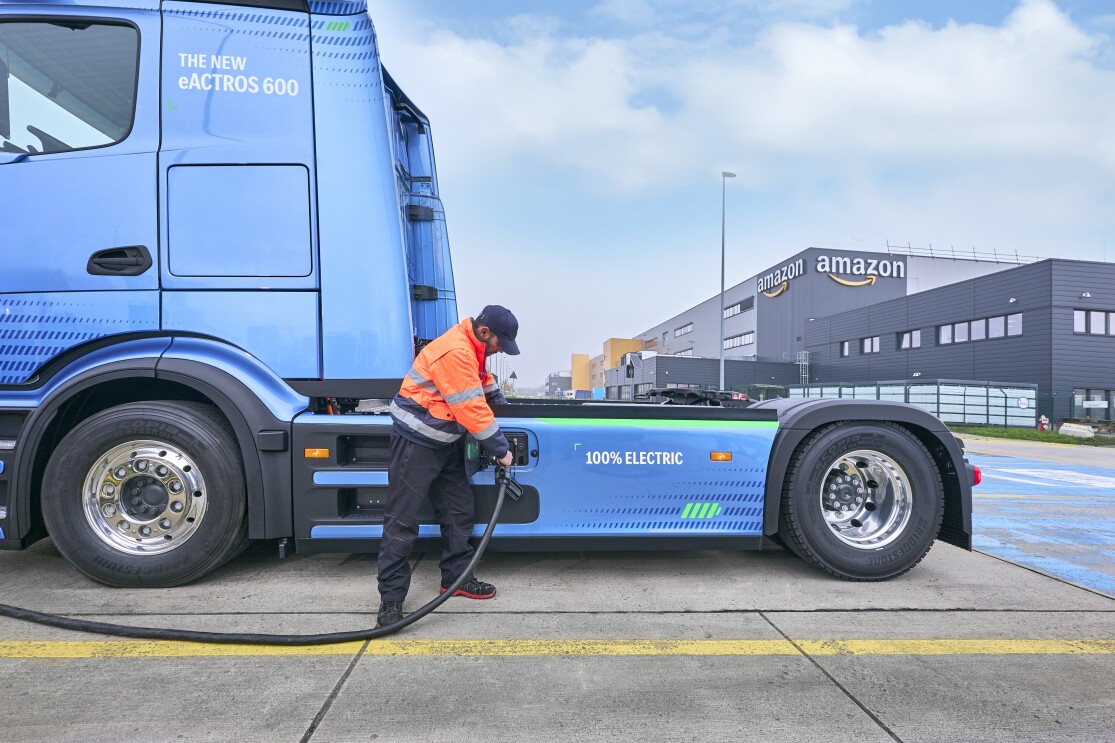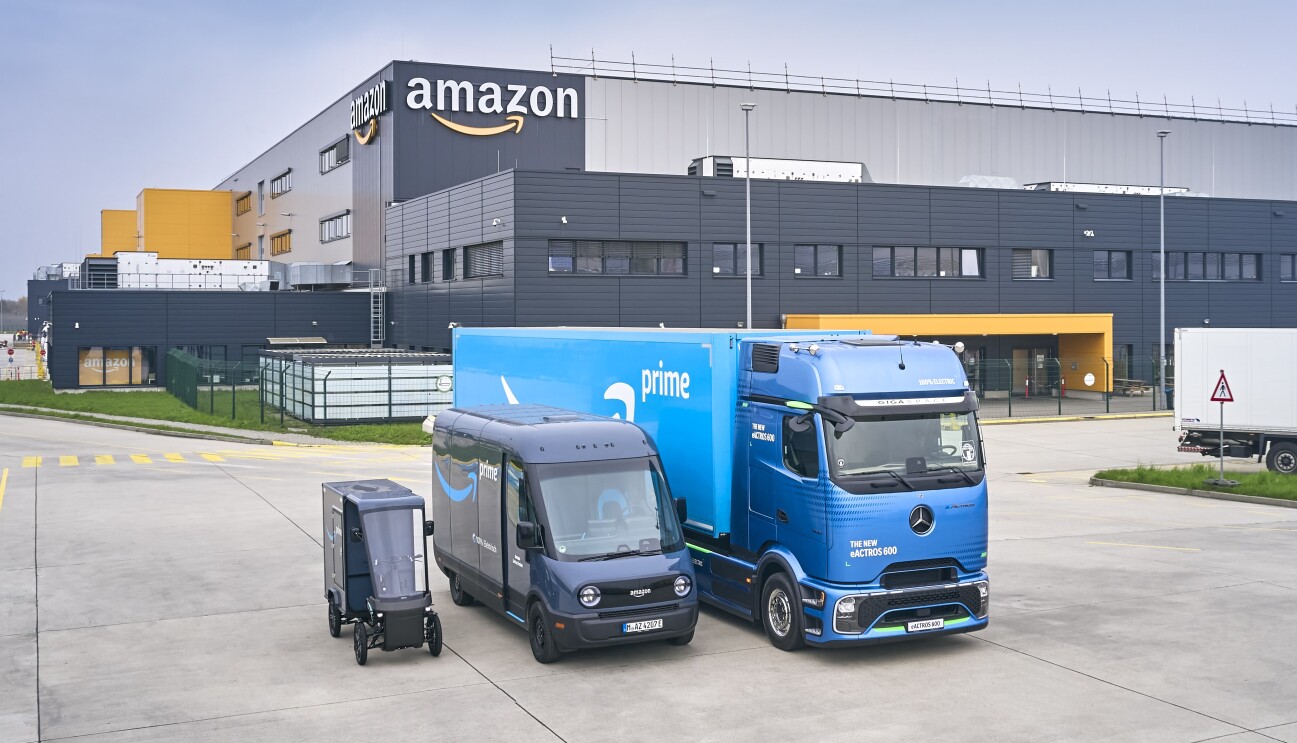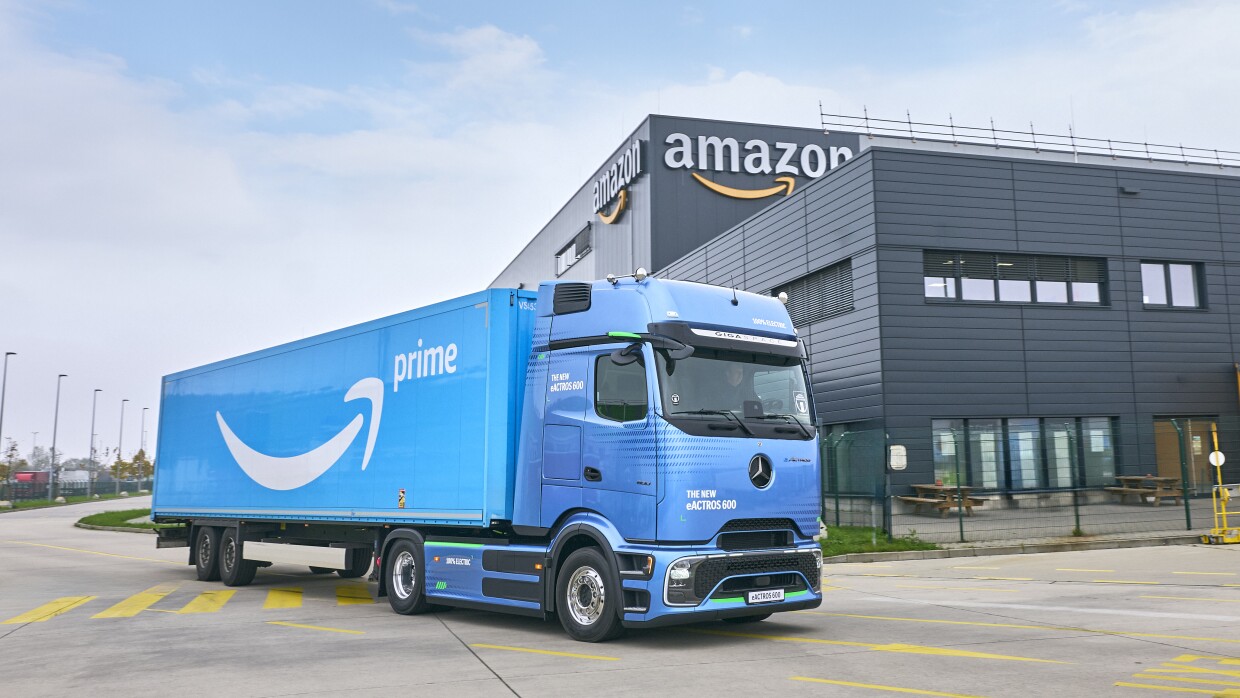We've announced our largest-ever order of electric heavy goods vehicles (eHGVs). More than 200 new eActros 600 vehicles from Mercedes-Benz Trucks will join Amazon’s existing eHGV transportation network from later this year.
This order is part of our commitment under The Climate Pledge to reach net-zero carbon emissions across our operations by 2040. For transportation, this includes increasing route efficiency, scaling zero-exhaust emission and alternative fuel vehicles, and partnering with industry and governments to accelerate the deployment of charging infrastructure.
The electric trucks will be deployed across high-mileage routes that make up Amazon’s middle-mile network in the UK and Germany, transporting trailers to and from Amazon’s fulfilment centres, sort centres and delivery stations. Combined, the zero-exhaust emission vehicles are expected to transport more than 350 million packages each year once fully operational.
Heavy vehicle charging infrastructure is a critical step to bringing more electric heavy goods vehicles to European roads, and is a challenge to scale due to the distance vehicles need to travel, how often and how fast they can charge, and the availability of power in suitable locations. Amazon will install 360kW electric charging points at key sites, capable of charging the battery of the 40-tonne trucks from 20 to 80 percent in just over an hour; and will work with stakeholders to support the installation of external charging points in suitable locations to enable longer journeys.

About the eHGVs
The eActros 600 is the flagship long-haul e-truck from Mercedes-Benz Trucks. It offers an installed battery capacity of more than 600 kilowatt hours and a range of 500 kilometres without recharge. Mercedes-Benz Trucks recently started production of the eActros 600 at its plant in Wörth, Germany.
Andreas Marschner, Vice President of Amazon Worldwide Operations Sustainability, said: “This order of more than 200 electric trucks underlines our commitment to being a leader in electrifying heavy goods transportation in Europe. It is the biggest electric heavy truck order by Amazon to date anywhere in the world, and is an important step as we work to achieve our Climate Pledge commitment to reach net-zero carbon emissions across our operations by 2040. We look forward to sharing our learnings, and will continue to collaborate with stakeholders to support the transition to more electric heavy goods vehicles on European roads, and so more efficient and lower-emission deliveries for Amazon’s customers.”
We’ve also announced that in the UK, we're using the electric rail network to transport packages at scale for the first time; and we’re launching new on-foot customer deliveries across London, with associates using carts that can be restocked on-the-go from vans dotted around the capital; and in Germany, the number of electric delivery vans from Rivian has been doubled to more than 600; and the success of electric cargo bike deliveries continues, with over 1.5 million packages delivered last year in Berlin alone. By end of 2024, these hubs were operational in Germany’s five largest cities: Berlin, Hamburg, Munich, Cologne, and Frankfurt, as well as in Koblenz, Aachen, Freiburg and Essen.

We're also investing more than €1 billion in the coming years to further electrify and decarbonise our transportation network across Europe to help reduce carbon emissions associated with delivering packages to customers. At the end of 2024, there were 38 eHGVs in Amazon’s transportation network across Europe, with nearly 50 electric heavy trucks recently deployed in California. In addition to eHGVs, Amazon and our delivery partners have more than 3,000 electric vans delivering packages to customers across Europe and this number is expected to grow to more than 10,000 vehicles by the end of 2025. We've also doubled the number of cities with micromobility hubs, which enable millions of deliveries on foot or using electric cargo bikes, from 20 in 2022 to more than 45 in 2024, with recent additions in Belfast, Madrid, Rome and Vienna joining London, Paris, Milan and Munich.
The electric fleet serves Amazon’s logistics services, which are available online through Amazon Freight (AF). If you are looking for freight services in the UK & EU, you can fill the form with your details and an Amazon Freight representative will reach out to you.
Read Amazon’s latest Sustainability Report here.












